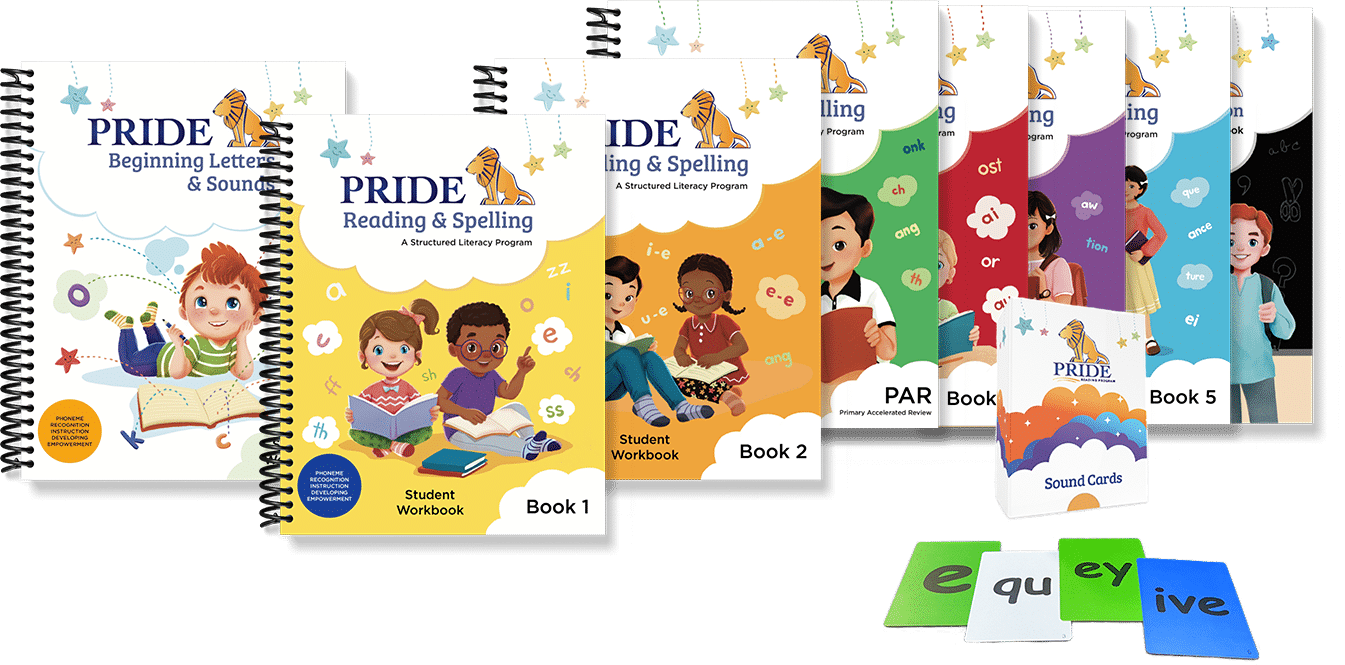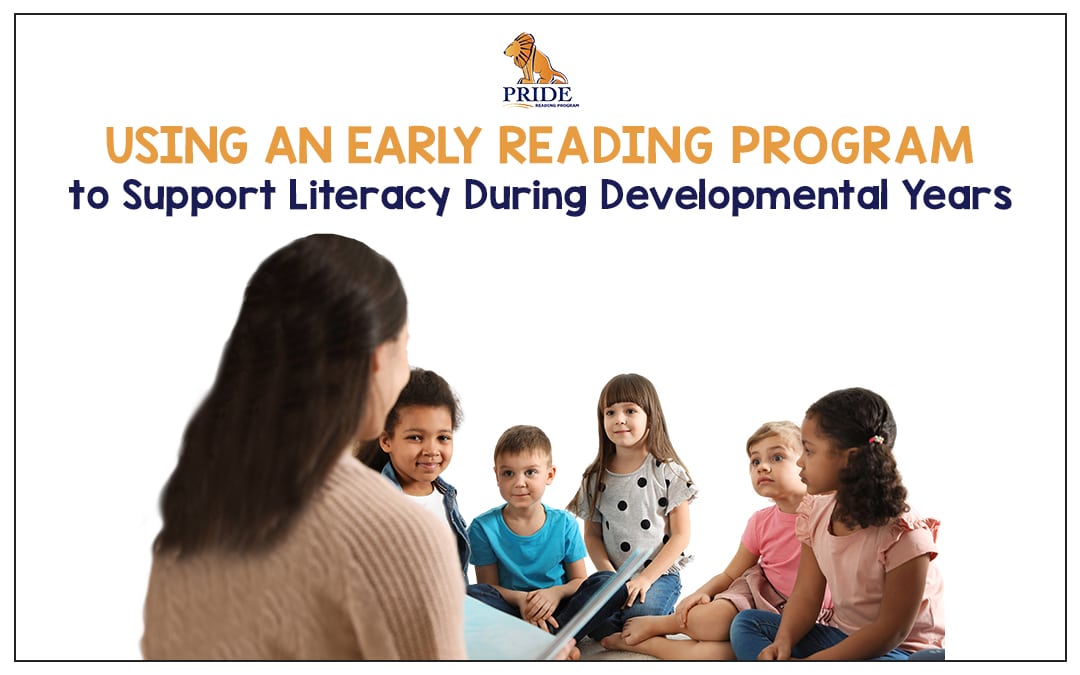An early reading program can provide essential support for young learners—learn how.
Children learn at every stage in their lives, but the early years are some of the most important ones in a child’s life—especially when it comes to language and learning. When children start reaching those initial school years, they are introduced to many core skills. The years between pre-K and first grade, in particular, can play a crucial role in a child’s long-term literacy and potential academic success. Early reading programs provide the perfect opportunity to support children during this time. Let’s explore how.
What is an Early Reading Program?
An early reading program is a type of reading program aimed at young learners to support literacy. These programs help children with everything from letters and sounds all the way to vocabulary and context clues. Using a tailored approach that supports each child at their level, an early reading program can help set students up for a lifetime of success. The National Reading Panel identified five key concepts of an effective early reading program:
- Phonemic Awareness
- Phonics
- Fluency
- Vocabulary
- Comprehension
Early literacy instruction typically will begin in Pre-K or Kindergarten. This instruction will include teaching the letters and sounds, beginning blending of letters and sounds, understanding stories and text, and instruction in vocabulary and sentence structure.
The Importance of Early Learning
Intervention for Long-Term Literacy
Developing Early Literacy Skills
An early learning intervention can help a child to effectively build essential skills early on. Taking the time to prioritize literacy when children enter their formative years will help them to develop core skills, including phonemic awareness, reading comprehension, and spelling. Early reading intervention programs, in particular, help children to solidify these abilities, empowering them to focus on more advanced skills at a younger age. These early literacy skills become tools that set children up for future success.
Building Phonological Awareness
Phonological Awareness involves being able to hear and recognize the different sounds within words. Research shows us that phonological awareness is highly related to later success in reading and spelling and children therefore need to master these three skills before learning to read.
1. Rhyming – Rhyming draws attention to the different sounds in our language and that words actually come apart. Hearing and using rhymes, rhythm, and repetition help children develop early reading skills.
2. Syllables – Syllable knowledge helps children break up words into chunks making it easier for them to read unfamiliar words. Understanding syllables also will help children learn hows to spell difficult words later on.
3. Phonemic Awareness – Phonemic awareness helps children hear and separate the individual sounds in spoken words. With phonemic awareness, children listen for, identify, and manipulate phonemes (sounds) so that the child can learn to recognize and create different words.
Learning with Phonics
Phonics is the understanding of how letters are used to represent speech sounds. It involves matching written letters with their corresponding sounds. For example, the letter S stands for the sound /s/. When children know the sounds of the letters that they see in print, they are able to read (decode) and spell (encode) these words. Phonics is most beneficial when it is initiated early in a child’s education – preferably in kindergarten and first grade.
Phonics lessons are built on previously taught information, from simple to complex. These include:
- Consonant and short vowel sounds
- Digraphs and blends
- Long vowels and other vowel patterns
- Syllables patterns
- Affixes
According to the Science of Reading research, children become better readers when they receive explicit and systematic phonics instruction.
Guiding Academic Performance
From the moment children first start reading in school, reading becomes the essential skill that will support their academic performance until they graduate. From social studies to mathematics, children rely on the written word while learning. An early reading program can help children to strengthen their level of literacy, allowing them to improve their performance in other subjects too.
Children with higher reading comprehension will absorb more information from textbooks, be more likely to spot important elements in test questions, and will often be exposed to more concepts, allowing them to improve their critical thinking skills. The National Early Literacy Panel determined that early language enhancement intervention can strongly improve oral language in addition to other key language skills.
Even small early literacy tips can support a child’s brain for years to come. When parents and teachers place an early focus on strengthening literacy for children, children gain an academic boost that will support them through school—including college.
Supporting Long-Term Success
Early literacy starts with a focus on reading simple words and phrases, but literacy is a skill that carries into every aspect of a person’s life. Children with low literacy levels make up 88% of students that do not graduate from high school. On the other hand, children who perform higher in reading are more likely to have better grades in college.
A child’s ability to read well will follow them in all that they do, often influencing how comfortable their lives will be in adulthood. Using an early reading program can help children build a strong foundation that they can continue to build upon with time. Early literacy intervention allows them to gain literacy skills during early learning years, so they can focus on learning and growing in other areas.
The Benefits Children Receive from an Early Reading Program
Many adults celebrate the young bookworms in their lives, but not everyone knows that an appreciation of reading is a habit that can be taught in early reading intervention programs. A child who participates in an early reading program can gain benefits that go beyond stronger literacy skills. Reading ability can influence everything from how a child feels about reading books all the way to how they feel about themselves.
Enhanced Mental Health
A child’s sense of self-esteem develops by the age of five years old. For many students, school is one of the biggest challenges they face when it comes to self-esteem. Unfortunately, it can feel even more challenging when students do not have a strong foundation in reading. When children struggle to read or fall behind their peers, it can negatively impact their mental health and shake their confidence.
Reading comprehension is correlated with self-esteem in students. Building a solid mastery of core reading skills can help them to feel more confident in school, whether they are asked to read aloud in class or to answer a question on the day’s reading material.
A Passion for Learning
A love of learning is something that must be taught, and it is supported in several ways through enhanced literacy. Confident readers are able to explore a wealth of information on their own, allowing them to learn and be more independent. Books are doorways to creativity and the world around us, turning early literacy skills into endless potential.
When children can read confidently, they are more able to access information on topics they are passionate about and will have more resources to support them if they come across any challenges. Reading allows children to enjoy stories, learn from history, and helps them think more critically about the quality of their reading materials. The end result is a supported love of learning and a child who knows how to access essential information for themselves.
Greater Opportunities
An early focus on reading helps children to start exploring more opportunities at an early age. Students who enjoy learning and perform better in school are more likely to be able to chase their dreams and develop essential skills to help them build the life that they want for themselves. Reading supports students at every level, whether they are trying to perform well to get into their preferred college or they want to work in a competitive field.
Support Children and Students with the PRIDE Reading Program!
Helping children to build early literacy skills can fundamentally change how they perform in school, work, and daily life. The PRIDE Reading Program offers curriculums for readers at different levels, empowering them to grow their skills and improve their language abilities.
We offer support for students, teachers, and parents to help improve early literacy skills for children during different developmental stages. To learn more about how an early literacy intervention can help your student to excel, explore our curriculum today!
Thank you for reading this article today. You might also enjoy reading:
How Children Learn to Read: A Guide for Parents and Teachers
How to Teach Letters and Sounds Correctly
Please don’t leave without checking out the PRIDE Reading Program. This Orton-Gillingham, Structured Literacy program is aligned with the Science of Reading and used by teachers, tutors, and homeschooling parents worldwide with great success.


Karina Richland, M.A., is the author of the PRIDE Reading Program, a multisensory Orton-Gillingham reading, writing, and comprehension curriculum that is available worldwide for parents, tutors, teachers, and homeschoolers of struggling readers. Karina has an extensive background in working with students of all ages and various learning modalities. She has spent many years researching learning differences and differentiated teaching practices. You can reach her by email at info@pridereadingprogram.com or visit the website at www.pridereadingprogram.com

